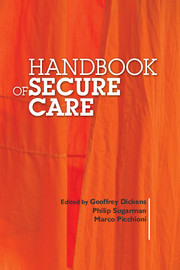Book contents
- Frontmatter
- Contents
- List of tables, boxes and figures
- List of contributors
- Preface
- 1 The evolution of secure and forensic mental healthcare
- 2 Mental disorder and offending
- 3 Clinical risk assessment in secure care
- 4 Risk management in secure care
- 5 Recovery in secure environments
- 6 Personality disorder
- 7 Women's mental health, aggression and offending
- 8 Offenders with intellectual disability in secure services and the criminal justice system
- 9 Secure mental healthcare for young people
- 10 Secure care for people with autism spectrum disorder
- 11 Acquired brain injury, trauma and aggression
- 12 Managing aggression and violence in older people
- 13 Firesetting in secure settings: theory, treatment and management
- 14 Specialist psychological treatment programmes in secure mental healthcare
- 15 Nursing in secure mental healthcare settings
- 16 Prescribing for specialist populations
- 17 Human rights in secure psychiatric care
- 18 Quality assurance and clinical audit in secure psychiatric care
- 19 Psychological support following violent assault and trauma: what works for staff in secure settings?
- Index
5 - Recovery in secure environments
Published online by Cambridge University Press: 02 January 2018
- Frontmatter
- Contents
- List of tables, boxes and figures
- List of contributors
- Preface
- 1 The evolution of secure and forensic mental healthcare
- 2 Mental disorder and offending
- 3 Clinical risk assessment in secure care
- 4 Risk management in secure care
- 5 Recovery in secure environments
- 6 Personality disorder
- 7 Women's mental health, aggression and offending
- 8 Offenders with intellectual disability in secure services and the criminal justice system
- 9 Secure mental healthcare for young people
- 10 Secure care for people with autism spectrum disorder
- 11 Acquired brain injury, trauma and aggression
- 12 Managing aggression and violence in older people
- 13 Firesetting in secure settings: theory, treatment and management
- 14 Specialist psychological treatment programmes in secure mental healthcare
- 15 Nursing in secure mental healthcare settings
- 16 Prescribing for specialist populations
- 17 Human rights in secure psychiatric care
- 18 Quality assurance and clinical audit in secure psychiatric care
- 19 Psychological support following violent assault and trauma: what works for staff in secure settings?
- Index
Summary
Introduction
The concept of recovery in mental health can be encapsulated by three words: hope, opportunity and control. Hope is essential in sustaining all people through times of difficulty. The opportunity to make friends, sustain relationships, to work and to partake in educational and recreational activities is key in helping people to develop a sense of personal identity. Being in control of matters that are significant in one's everyday life is psychologically important, as is maintaining one's self-control.
In the past decade, recovery has become the clinical model for the delivery of mental health services in the UK. Following from previous guidance such as A Common Purpose: Recovery in Future Mental Health Services (Care Services Improvement Partnership et al, 2007) and Refocusing the Care Programme Approach (Department of Health, 2008), which promoted recovery-oriented mental health services, the cross-government mental health outcomes strategy for England (No Health without Mental Health; HM Government, 2011) placed recovery-based practice at the centre of mental health service delivery. Recovery-oriented services have been further supported through Implementing Recovery: A Methodology for Organisational Change, a joint project between the NHS Confederation and the Centre for Mental Health, using the ten organisational challenges identified by the Centre for Mental Health (Shepherd et al, 2009).
In this chapter we examine what the concept of recovery means for users of secure mental health services. We discuss the barriers to recovery and identify how hope, opportunity and choice can be supported. We then examine how changes can be embedded at an organisational level to support patient recovery in secure settings on a personal level.
Recovery and mental health
There are a number of definitions of recovery; a comprehensive and commonly used one is:
‘a deeply personal, unique process of changing one's attitudes, values, feelings, goals, skills and/or roles. It is a way of living a satisfying, hopeful and contributing life, even with limitations caused by illness. Recovery involves the development of new meaning and purpose in one's life’ (Anthony, 1993).
- Type
- Chapter
- Information
- Handbook of Secure Care , pp. 67 - 83Publisher: Royal College of PsychiatristsPrint publication year: 2015



